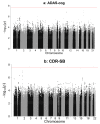Cognitive Decline in Alzheimer's Disease: Limited Clinical Utility for GWAS or Polygenic Risk Scores in a Clinical Trial Setting
- PMID: 32370229
- PMCID: PMC7290959
- DOI: 10.3390/genes11050501
Cognitive Decline in Alzheimer's Disease: Limited Clinical Utility for GWAS or Polygenic Risk Scores in a Clinical Trial Setting
Abstract
Introduction: Alzheimer's disease (AD) is a progressive and irreversible neurological disease. The genetics and molecular mechanisms underpinning differential cognitive decline in AD are not well understood; the genetics of AD risk have been studied far more assiduously. Materials and Methods: Two phase III clinical trials measuring cognitive decline over 48 weeks using Alzheimer's Disease Assessment Scale-cognitive subscale (ADAS-cog, n = 2060) and Clinical Dementia Rating-Sum of Boxes (CDR-SB, n = 1996) were retrospectively genotyped. A Genome-Wide Association Study (GWAS) was performed to identify and replicate genetic variants associated with cognitive decline. The relationship between polygenic risk score (PRS) and cognitive decline was tested to investigate the predictive power of aggregating many variants of individually small effect. Results: No loci met candidate gene or genome-wide significance. PRS explained a very small percentage of variance in rates of cognitive decline (ADAS-cog: 0.54%). Conclusions: These results suggest that incorporating genetic information in the prediction of cognitive decline in AD currently appears to have limited utility in clinical trials, consistent with small effect sizes estimated elsewhere. If AD progression is more heritable soon after disease onset, genetics may have more clinical utility.
Keywords: Alzheimer’s disease; Alzheimer’s disease late onset; apolipoprotein E4; dementia; genetic variation; genome-wide association study; polymorphism; risk factors; single nucleotide.
Conflict of interest statement
Data Availability: The GSK sponsored summary statistics generated and/or analysed during the current study can be requested by making an enquiry via www.clinicalstudydatarequest.com.
Figures
References
-
- Bertram L., Lange C., Mullin K., Parkinson M., Hsiao M., Hogan M.F., Schjeide B.M., Hooli B., Divito J., Ionita I., et al. Genome-wide association analysis reveals putative Alzheimer’s disease susceptibility loci in addition to APOE. Am. J. Hum. Genet. 2008;83:623–632. doi: 10.1016/j.ajhg.2008.10.008. - DOI - PMC - PubMed
-
- Saunders A.M., Strittmatter W.J., Schmechel D., George-Hyslop P.H., Pericak-Vance M.A., Joo S.H., Rosi B.L., Gusella J.F., Crapper-MacLachlan D.R., Alberts M.J., et al. Association of apolipoprotein E allele ϵ4 with late-onset familial and sporadic Alzheimer’s disease. Neurology. 1993;43:1467–1472. doi: 10.1212/WNL.43.8.1467. - DOI - PubMed
-
- Jansen I.E., Savage J.E., Watanabe K., Bryois J., Williams D.M., Steinberg S., Sealock J., Karlsson I.K., Hägg S., Athanasiu L., et al. Genome-wide meta-analysis identifies new loci and functional pathways influencing Alzheimer’s disease risk. Nat. Genet. 2019;51:404–413. doi: 10.1038/s41588-018-0311-9. - DOI - PMC - PubMed
-
- Ramanan V.K., Risacher S.L., Nho K., Kim S., Shen L., McDonald B.C., Yoder K.K., Hutchins G.D., West J.D., Tallman E.F., et al. GWAS of longitudinal amyloid accumulation on 18F-florbetapir PET in Alzheimer’s disease implicates microglial activation gene IL1RAP. Brain. 2015;138:3076–3088. doi: 10.1093/brain/awv231. - DOI - PMC - PubMed
Publication types
MeSH terms
Substances
LinkOut - more resources
Full Text Sources
Medical
Miscellaneous


